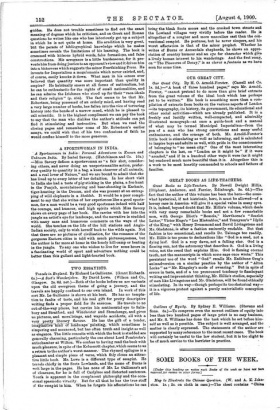TWO ESSAYISTS.
Travels in England. By Richard Le Gallienne. (Grant Richards. 6s.)—.4 Scot's Wanderjahre. By David Lowe. (Wilson and Co., Glasgow. 2s. 6d. net.)—Both of the books before us are variants upon the old evergreen theme of going a journey, and the travels are happily confined to our own island. In work of this sort Mr. Le Gallienne is shown at his best. He has no tempta- tion to faults of taste, and his real gift for pretty descriptive writing finds a proper field for its exercise. He travels to no out-of-the-way places, but carries. his sentimental eye to Salis- bury and Stratford, and Winchester and Stonehenge, and gives us pictures, and moralisings, and wayside accidents, all with a very pretty literary flavour. He has the gift of a tender, i aria Of. laifdscape painting; iv hia scene-tithes is simpering and mannered, but has often truth and insight as well as elegance. The little conceits with which the book is studded are generally charming, particularly the one about Lord Pembroke's antechamber at Wilton. We confess to having read the book with much pleasure, in spite of the Kelmscott chapter, which seems to us a return to the author's worst manner.- The rhymed epilogue is a pleasant and simple piece of verse, which fitly closes an attrac- tive little book. Mr. Lowe is a different type of essayist. He travels chiefly in the Scots Lowlands, and the name of Burns is writ large in the pages. He has none of Mr. Le Gallienne's art of clearness, for he is full of Carlylese and distorted sentences. Youth is apparent in the complacent philosophy and the occa- sional spasmodic vivacity. But for all that he has the true stuff A the essayist in him. When he forgets his affectations he can bring the bleak Scots moors and the crooked town streets and the Lowland villages very vividly before the reader. He is altogether of a rougher and more masculine cast than the con- ventional essayist. He postures, but he never simpers, and his worst affectation is that of the minor prophet. Whether he writes of Burns or Annandale shepherds, he shows an appre- elation of country humour and an eye for character which give a lively human interest to his -wanderings. And the first-essay, on "The Pleasures of Decay," is as clever &fantasia as we have seen for some time.


































 Previous page
Previous page